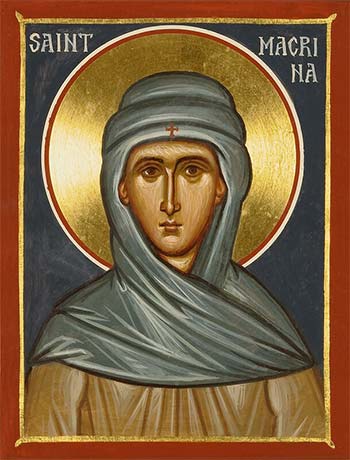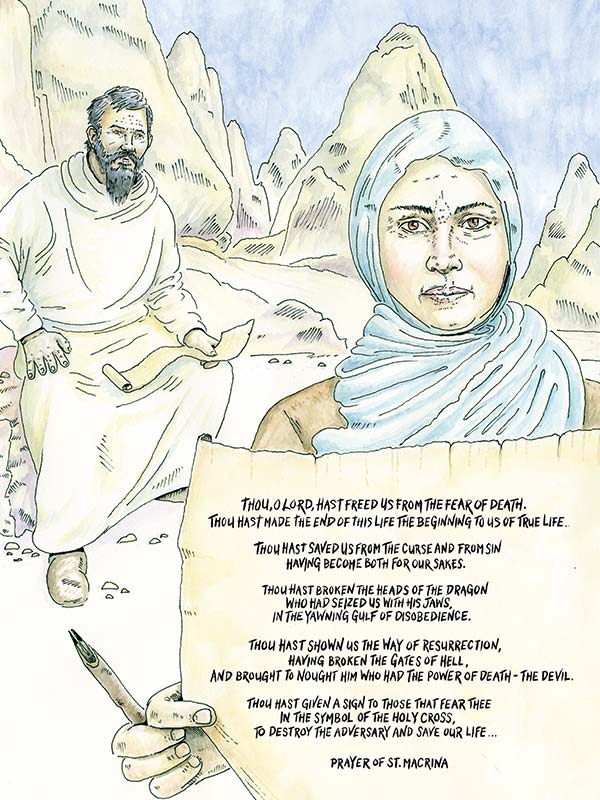Subtotal: $
Checkout
Saint Macrina
By Susannah Black Roberts and Jason Landsel
August 8, 2020
Available languages: Français
Around AD 375, a Roman soldier and his wife visited a villa on the River Iris, in Turkey. They brought their baby daughter, who was suffering from an eye infection. The mistress of the villa, Macrina, cuddling the baby on her lap, noticed, and promised the couple an ointment that would cure it. They had dinner; the talk, which, the husband said, “entertained and cheered me royally,” flowed freely, running to theology.
As the couple was heading home, the wife realized they’d forgotten the ointment. Irritated, the soldier told one of their servants to head back to Macrina’s villa for it. But just then, his daughter, in her nurse’s arms, looked over at her mother. The mother gasped. “Look! The healing which comes from prayer, she has given us; … there’s nothing whatsoever left of the eye disease!” She took the baby from the nurse and put her in her father’s arms. He looked, and all signs of infection were gone.
He hadn’t, he said, believed in the miracles recorded in the Gospels. He did now. If God could do this through the prayers of this woman, then he could do the same in Christ, who healed the blind.
It is not the only such story told about Macrina, but it’s an illustrative one. The eldest of nine surviving children, she was – by her brothers’ accounts – the heart of the family, as well as its keenest mind; the one who taught them all, the one who drew them all, through her sheer delight in Christ, to lives that shook the world.

Two of those brothers were Saint Gregory of Nyssa and Saint Basil the Great, brilliant theologians and defenders of orthodox doctrine at the Council of Constantinople. Macrina taught them both through their boyhoods. Gregory, quiet and thoughtful, went on to study classical literature and philosophy; Basil, fiery and outspoken, studied law and rhetoric. Both ended up renouncing the careers their education had set them on, and seeking ordination.
The youngest brother, Peter, and Basil were cofounders of the monastery that corresponded to Macrina’s convent, in the big villa inherited from their parents. Basil would later be appointed Bishop of Caesarea, two hundred miles to the south, where he founded a soup kitchen and a huge hospital/poorhouse, as well as preaching daily and taking the time to write sharply worded letters to politicians. (At one point, he more or less took over the administration of the city, much to the annoyance of his contemporary Eusebius.) But his heart remained in the community he’d founded with his siblings; Macrina’s hospitality as well as her teaching had marked him for life.
This joint household – full of children, because Macrina had the habit of adopting babies abandoned during times of famine – was a hub of theological conversation and a stable home for the brothers between travels.
“Thou, O Lord, hast freed us from the fear of death.”
—Saint Macrina
It was not simply a center of intellectual ferment and political strategizing but a social experiment: Macrina had decided, as the community was forming, that there would be no distinctions in rank among its members. Some of the sisters, the women whose work she shared, had been her maidservants; some of the brothers whose theological debate flowed freely at Basil and Peter’s table had been born slaves.
They talked and they wrote, this family; they wrote a lot. They wrote about the kinds of things we write about, and read about: the Trinity, economics, the nature of justice, politics, the nuts and bolts of founding not just monasteries but monasticism itself. They wrote about each other too – Gregory wrote his sister’s biography in the form of a letter to a monk called Olympius.
When Basil died, Gregory came to Macrina for comfort, only to find her also very ill. “Well, she gave in to me for a little while, like a skillful driver, in the ungovernable violence of my grief,” he said, “and then she tried to check me by speaking, and to correct with the curb of her reasonings the disorder of my soul. She quoted the Apostle’s words about the duty of not being grieved for them that sleep; because only men without hope have such feelings.”
He was not having it. “How can that ever be practiced by mankind? There is such an instinctive and deep-seated abhorrence of death in all!” Especially, he says, the death of those we love, those who made such good use of every moment, who had been so vividly alive.
She reminded him of the doctrine: the soul does not die; there is a resurrection. “But” – I’m paraphrasing – “how can I know? The Stoics say –” and they were off again, the two of them, debating. Once again she taught him: that day, the day before she died, she argued him into the ground, turning his eyes back to the God she would soon meet. She died with a prayer on her lips: “Thou, O Lord, hast freed us from the fear of death. Thou hast made the end of this life the beginning to us of true life …”
“Her life was such,” Gregory wrote of the sister he called the Teacher, “since God provided for her, that she never stopped working her hands in the service of God neither did she turn away people who sought her help … for God with his blessings secretly made the small resources from her good works grow like seeds into an abundant stream of fruitfulness.”
There’s a hospitality in the accounts they left of each other, this astonishing family, like the hospitality that will be the great table-conversation of the kingdom, the talk flowing on, welcoming the guest and wayfarer with delight.

Jason Landsel, Saint Macrina
Image courtesy of Jason Landsel
Already a subscriber? Sign in
Try 3 months of unlimited access. Start your FREE TRIAL today. Cancel anytime.




















